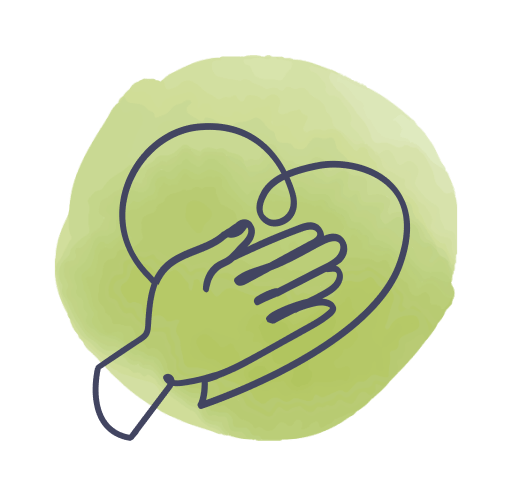Parenting, Redefined.
Become a role model
INTRODUCING THE BECOMING LAB APPROACH
Educate & Integrate Heart & Mind

Areas of focus
To transform our parenting experience we focus on understanding ourselves as learners, discovering mental roadblocks, and developing skills. Learn more about the foundations:
Brain
Parenting is a learning journey through which we evolve as humans. Understanding the brain and how it learns can help us learn smarter. Neuroscience shows that there are various factors that impact learning such as the needs, beliefs, emotions, environment and the context we are in. Becoming aware of the brain's natural mechanisms, its gifts and limitations, and learning how to work with them will create strong learning foundations and ease the progress towards our parenting aspirations.Emotions
Emotions are signals. They carry valuable data that teaches us whether our needs are being met, whether our values are being exercised, whether we are safe, and more. Noticing what brings us joy and satisfaction is equally important to noticing what triggers uncomfortable emotions like fear, shame or anger. Learning to name emotions, accept them, and discover the deep meaning beneath them help us connect with our values, take new perspectives, and make courageous choices that are better aligned with our aspirations.Compassion
Compassion is the sense of concern and care we feel when someone suffers. While scientific findings show that basic human nature is compassionate, it takes practice to nurture a genuine flow of compassion during conflicts. Nonviolent communication is considered the language of compassion. It is based on a fundamental principle: underlying all human actions are needs that we are all seeking to meet. When our needs are not being met, our capacity to be compassionate is limited. Acknowledging our needs, communicating them openly, and exploring new strategies to meet them, nurture a sense of compassion for ourselves and others. It also deepens our connection with others and leads to collaboration and peace.Optimism
Parenting is a journey filled with ever-changing challenges. The challenges keep changing as the kids grow, as the family expends, and as we grow. Cultivating optimism is not about diminishing or ignoring the difficulties. It’s about seeing the difficulties in a larger context that includes all the good things we have in life and the progress that we have made till now. Practicing appreciation and reframing fosters optimism, which strengthens the sense of hope and motivates us to find constructive ways to move forward.Mindsets
Decades of research led by Stanford Prof. Carol Dweck shows that when we hold a growth mindset - a belief that human abilities are malleable, it motivates us to engage in learning-oriented behaviors such as seeking challenges, learning from mistakes and persevering. When we approach parenting with a growth mindset, with a belief that we can develop our parenting skills and the relationships we have with the kids, we focus on learning from parenting challenges (rather than blaming and judging) and open to exploring new strategies to progress towards our aspirations.Expertise
Showing up as role models requires the development and integration of various skills. Research led by Anders Ericsson teaches us how to get better at things that are important for us. It starts by getting clarity on where we are now in relation to the qualities we want to cultivate in ourselves and in our home. Then, we want to focus on deliberate practice - an intentional practice in which we seek to improve in areas that we haven't mastered, focusing on a very specific sub-goal, with full attention, feedback, and an ongoing process of refinement. Deliberate practice takes time, effort, patience, and focus, but gradually it leads to the desired progress we seek.FROM THEORY TO PRACTICE
What does it mean for you?
Care for
You
& your wellbeing

Learn to
Explore, Experiment
& connect the dots
In the Lab, we draw insights from daily challenges and leverage them to advance our abilities. We explore (1) the needs and beliefs that drive our actions in challenging moments; (2) strategies to meet our needs and transform limiting beliefs, and (3) learning and development of sub-skills so we can role model what we deeply want. Additionally, we invite challenges by experimenting with various science-based strategies and routines to redesign our minds and environment to support a lifelong learning journey.
Intentionally practice and
Develop Life Skills
to make progress

Benefits
You Become The Change
You walk your talk with confidence
More peace in your heart & home
Become a compassionate mentor




philosophy
Parenting Is Becoming

Parenting, Redefined.
Become a role model.

As parents, what we do is much more important than what we say. Kids observe what we do and imitate. They learn how we react to conflict and tension, how we deal with challenges, and how we treat ourselves and others. Parenting is, first and foremost, about role modeling. To become the role models we want, we need to think like learners.
INTRODUCING THE BECOMING LAB APPROACH
Educate & Integrate
Heart & Mind
The Becoming Lab approach was inspired by the science of learning – a field that connects research findings across many scientific disciplines including neuroscience, psychology, social sciences and more.
Science explains why we experience the parenting gap, how the brain drives our actions, why change is possible but takes time and effort, and even why we’re doing our best at any moment (even when we’re not proud of ourselves).


Areas of focus
To transform our parenting experience we focus on understanding ourselves as learners, discovering mental roadblocks, and developing skills. Learn more about the foundations:
Brain
Parenting is a learning journey through which we evolve as humans. Understanding the brain and how it learns can help us learn smarter. Neuroscience shows that there are various factors that impact learning such as the needs, beliefs, emotions, environment and the context we are in. Becoming aware of the brain's natural mechanisms, its gifts and limitations, and learning how to work with them will create strong learning foundations and ease the progress towards our parenting aspirations.Emotions
Emotions are signals. They carry valuable data that teaches us whether our needs are being met, whether our values are being exercised, whether we are safe, and more. Noticing what brings us joy and satisfaction is equally important to noticing what triggers uncomfortable emotions like fear, shame or anger. Learning to name emotions, accept them, and discover the deep meaning beneath them help us connect with our values, take new perspectives, and make courageous choices that are better aligned with our aspirations.Compassion
Compassion is the sense of concern and care we feel when someone suffers. While scientific findings show that basic human nature is compassionate, it takes practice to nurture a genuine flow of compassion during conflicts. Nonviolent communication is considered the language of compassion. It is based on a fundamental principle: underlying all human actions are needs that we are all seeking to meet. When our needs are not being met, our capacity to be compassionate is limited. Acknowledging our needs, communicating them openly, and exploring new strategies to meet them, nurture a sense of compassion for ourselves and others. It also deepens our connection with others and leads to collaboration and peace.Optimism
Parenting is a journey filled with ever-changing challenges. The challenges keep changing as the kids grow, as the family expends, and as we grow. Cultivating optimism is not about diminishing or ignoring the difficulties. It’s about seeing the difficulties in a larger context that includes all the good things we have in life and the progress that we have made till now. Practicing appreciation and reframing fosters optimism, which strengthens the sense of hope and motivates us to find constructive ways to move forward.Mindsets
Decades of research led by Stanford Prof. Carol Dweck shows that when we hold a growth mindset - a belief that human abilities are malleable, it motivates us to engage in learning-oriented behaviors such as seeking challenges, learning from mistakes and persevering. When we approach parenting with a growth mindset, with a belief that we can develop our parenting skills and the relationships we have with the kids, we focus on learning from parenting challenges (rather than blaming and judging) and open to exploring new strategies to progress towards our aspirations.Expertise
Showing up as role models requires the development and integration of various skills. Research led by Anders Ericsson teaches us how to get better at things that are important for us. It starts by getting clarity on where we are now in relation to the qualities we want to cultivate in ourselves and in our home. Then, we want to focus on deliberate practice - an intentional practice in which we seek to improve in areas that we haven't mastered, focusing on a very specific sub-goal, with full attention, feedback, and an ongoing process of refinement. Deliberate practice takes time, effort, patience, and focus, but gradually it leads to the desired progress we seek.
FROM THEORY TO PRACTICE
What does it mean
for you?

Care for
You
& your wellbeing
Becoming better role models requires learning – a process that, according to science, is impacted by various factors including the learners’ needs, beliefs, wellbeing, emotions, passions, context and environment. To make our learning journey effective, we start honoring and treating ourselves as learners – we intentionally develop skills & routines to meet our needs and care for our wellbeing. This learner-centered principle will set us up to approach the learning journey and inevitable challenges ahead with more calm, optimism, and compassion.
Learn to
Explore, Experiment
& connect the dots
In the Lab, we draw insights from daily challenges and leverage them to advance our abilities. We explore (1) the needs and beliefs that drive our actions in challenging moments; (2) strategies to meet our needs and transform limiting beliefs, and (3) learning and development of sub-skills so we can role model what we deeply want. Additionally, we invite challenges by experimenting with various science-based strategies and routines to redesign our minds and environment to support a lifelong learning journey.
Intentionally practice and
Develop Life Skills
to make progress
Living and modeling our values requires the development and integration of various skills — from communication and compassion to listening and noticing, from emotion regulation and appreciation to creative problem-solving and collaboration. Because theory doesn’t prompt behavioral change, a strong focus on practice is needed. Intentional practice takes time, attention, refinement, and efforts that eventually lead to structural change in the brain. This change creates a new foundation for the values and qualities we want to cultivate.

Benefits
You Become The Change
Gradually, you’ll notice a powerful change in three main areas:
You walk your talk with confidence
You’ll replace judging, blaming, and punishing with teaching, learning, and choosing actions that are more aligned with your aspirations. Your learning, effort, and progress become visible everyday.
More peace in your heart & home
You’ll finally feel that your heart is softening. You’ll become less triggered and more centered when you face challenges. You’ll feel seen, understood and more connected to your loved ones.
Become a compassionate mentor
You become better at connecting with your kids’ emotional struggles, seeing their deep needs, offering a compassionate perspective, and accompanying their journeys toward their own aspirations.





